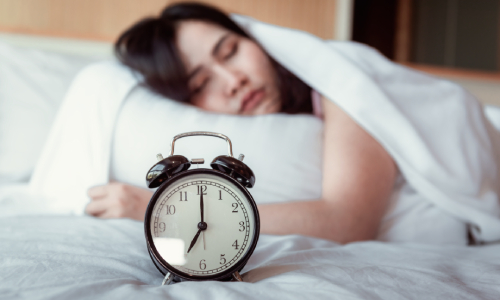The importance of sleep | Understanding the benefits of quality sleep for your health
- Overview
Sleep is essential for our health and wellbeing, yet millions of us struggle to get enough of it and suffer as a result. 74% of adults got lower quality sleep over the past 12 months, according to our Healthier Nation Index.
You might feel the most immediate effects of poor sleep with the general demise of your ability to function effectively throughout the day. You can find it hard to concentrate, or feel cranky, over-emotional or stressed.
Over time, a lack of adequate sleep can be extremely detrimental to both your physical and mental health. Therefore it’s important to make sure you’re getting enough good quality sleep.
What is good quality sleep?

While duration is key, sleep quality is often overlooked. Even if you regularly get your nightly quota of sleep, you may still wake up feeling lethargic and tired, relying on coffee, and wishing the day away so you can get your head down again. If so, there's a good chance your sleep quality needs some work.
Good quality of sleep is about having the right balance of deep, slow-wave sleep and shallow, rapid eye movement (REM) sleep – where dreaming occurs.
There are three aspects that can be assessed to determine your sleep quality:
- Sleep latency: This is how long it takes you to fall asleep – within 30 minutes suggests your sleep quality is good
- Sleep waking: If you wake up a lot during the night, it can disrupt your sleep cycle – if you only wake up once, or not at all, it suggests you’re getting good quality sleep
- Wakefulness: This is how many minutes you spend awake during the night after going to sleep – those with good sleep quality have 20 minutes or less of wakefulness.
The benefits of good quality sleep
Good quality sleep allows your body to recover and your mind to make sense of the learnings of the day:
- Sleep helps your brain work properly: While you sleep, your brain is forming the pathways necessary for learning and creating memories. When we get sufficient sleep, we can maintain normal levels of cognitive skills, such as speech and memory, including our ability to think.
- Sleep helps to repair cell damage: Major restorative functions occur while we sleep including tissue repair, and muscle and bone growth.
- Sleep strengthens our immune system: During sleep our bodies produce cytokines and T-cells, which target infection and inflammation. Sleep can also benefit our immune memory, reinforcing the immune system’s ability to remember and react to dangerous viruses and bacteria. This is why we tend to sleep much longer when we have a cold or flu.
How much sleep do you need?
The majority of healthy adults need 7.5–8.5 hours of sleep per night. This is around five sleep cycles.
There are five stages of sleep and each distinct stage serves a different purpose. You cycle through all five stages several times (on average four to six times) each night, not always in the same order.
A complete sleep cycle takes an average of 90 to 110 minutes.
Stage 1 – The lightest sleep
- This is the lowest stage of sleep, the transition phase, where you feel yourself drifting off
- You don't spend too much time in Stage 1 sleep, typically five to ten minutes, just enough to allow your body to slow down and your muscles to relax.
Stage 2 – Light sleep
- The second stage of sleep is still considered light sleep
- Your brain activity starts to slow down, as well as your heart rate and breathing
- You’re beginning to reach a state of total relaxation in preparation for the deeper sleep to come.
Stage 3 and Stage 4 – Deep sleep
- These are the deep sleep stages, with stage 4 being more intense than stage 3
- It's harder to rouse you during these stages, and if someone woke you up, you would feel disoriented for a few minutes
- It is during the deep stages of sleep that the body repairs and regrows tissues, builds bone and muscle, and strengthens the immune system.
Stage 5 – Active sleep / REM (rapid eye movement)
- This is the stage of sleep when you dream
- It's also referred to as ‘active sleep’ or REM sleep
- During this stage, blood flow, breathing and brain activity increases
- You can have intense dreams during this stage of sleep as the brain is very active.
The effects of sleep deprivation on the body

Sleep is closely linked to your physical and mental health. If you’re not sleeping enough, the effects could be more significant than bags under your eyes, and there could also be an impact on how you think and feel.
As the number of people getting less sleep has risen, so the number of people at risk of life-threatening metabolic and cardiovascular diseases has risen too. The reason for this correlation may lie in the effects that poor quality or reduced sleep can have on your behaviour and physiology.
Hypertension (high blood pressure)
While sleeping, your resting heart rate and blood pressure are lower, especially during the deeper stages of sleep. Therefore, the worse you sleep, the longer your heart has to work harder, which can lead to high blood pressure.
Cardiovascular disease
It’s thought that sleeping too little can disrupt underlying health conditions and biological processes like glucose metabolism, blood pressure, and inflammation, increasing the risk of heart disease.
Diabetes
Both reduced sleep quality and quantity has been shown to lower insulin sensitivity, making it harder for your body to regulate blood glucose levels, which can lead to diabetes.
Low immunity
Disease-fighting substances are released while we sleep, so sleep deprivation can decrease the availability of these substances, leaving us more susceptible to new viruses and bacteria.
Obesity
During sleep, your body regulates the hormones that control your appetite. Two key ones are ghrelin, which makes us feel hungry, and leptin, which signals when we’re full. Poor sleep is associated with higher levels of ghrelin and lower levels of leptin. This can result in seeking out more snacks, overeating without realising, and, over time, obesity.
If you’re feeling lethargic and tired, you’re also less likely to exercise, decreasing the amount of calories you burn, which has a direct effect on your weight.
Sleep is also vital for regulating your mood. Less sleep could see you happy one moment and feeling low the next. Low mood can trigger emotional or ‘comfort’ eating, when our bodies crave high-fat, high-sugar foods. When eaten, these foods trigger the pleasure response in your brain, and we’re hardwired to crave them in times of distress.
If you struggle to cope with these effects, it’s likely you’ll gain weight – another risk factor for diabetes and cardiovascular disease. Equally, your cholesterol levels, blood pressure and other risk factors could increase to dangerous levels as you gain weight.
If you've realised you're gaining weight and want to explore ways to tackle it, speak to a personal trainer or nutritional therapist.
The effects of sleep deprivation on the mind

In the short term, sleep deprivation can dramatically slow your response time and ability to make rational decisions, potentially placing you and others in harm’s way.
Poor sleep has also been linked to negative changes to emotions and mood. Prolonged sleep deprivation can be debilitating and can even cause serious harm to your mental health.
Work performance
A lack of sleep can lead to poor emotional regulation, stifled creativity and problem solving, reduced efficiency and productivity and reduced memory formation, all of which are likely to impact your performance at work.
Accidents
The most immediate effect of sleep deprivation is sleepiness. We may experience this as general fatigue, lack of motivation and concentration, or even nodding off.
This can take its toll on your perception and judgment, resulting in an increased risk of errors and accidents. It’s been reported that work-related accidents cost the UK as much as £240 million per year.
In one shocking study, conducted in 2000, alcohol was used to illustrate the impact of sleep deprivation on cognitive performance. It found that the cognitive ability of someone who’d been awake for 17 hours was the same as a person with a blood alcohol concentration of 0.05% (the legal driving limit in the UK is only slightly higher at 0.08%). After being awake for 24 hours, performance was equivalent to those with a blood alcohol concentration of 0.1% – well over the limit at which it’s legal to drive.
Indeed, fatigue is implicated in 20% of accidents on major roads. So take heed of signs that say ‘Tiredness can kill’, and avoid driving or operating heavy machinery when you’re sleep deprived.
Low mood
Sleep and mood are closely connected and it’s been found that poor or inadequate sleep can cause irritability and stress.
During a 2015 sleep study, healthy young adults subjected to partial sleep restriction demonstrated higher levels of cortisol (the stress hormone), particularly in the evening. They also exhibited altered activity in their sympathetic nervous system – the system responsible for the fight-or-flight response. In short, having slept less, the subjects were more on edge and stressed.
Prolonged sleep deprivation has also been associated with depression, anxiety, and in extreme cases, thoughts of suicide or self-harm.
While these severe cases may have other factors involved, such as poor diet, lack of exercise or substance abuse, emotional distress shouldn’t be ignored. If your mental health is affecting your sleep, read the CBT formula for good sleep.
You can also tackle stress and low mood by talking through how you're feeling with someone you trust. If you feel like you can't control your emotions, are having desperate thoughts, or know someone who is, speak to a therapist in complete confidence today.
How to counter sleep deprivation

If you’re finding it difficult to get good night’s sleep, and you’re already tired, it can be hard to know where to start. But there are lots of things you can do.
Eat well
Aim to eat three healthy meals a day, with a couple of well-chosen snacks. It can be all too easy to reach for sugary foods and caffeine when you’re tired, so instead here are some healthier nutrition tips for boosting energy.
Stay active
If you really don’t have the energy for the gym, go for a brisk walk around the block to elevate your heart rate. Read 5 easy tips to get active and improve your fitness.
Make time to relax
If you’re feeling stressed or anxious, it can be hard to switch off during the day, and racing thoughts can keep you awake at night (insomnia). Ensure you make time for yourself and your hobbies – doing something you enjoy takes you into the present moment and out of your head. Why not read our beginner’s guide to relaxing?
Create a bedtime routine
Read on to find out more. Also take a look at our tips for a good night’s sleep.
If you’re struggling to achieve the full 7.5–8.5 hours of sleep per night due to factors you can’t control – a new baby, for example – make an extra effort to maintain a healthy diet and exercise programme, and return to a regular sleep pattern as soon as you can.
How to improve your sleep quality
What you do in the hour leading up to bed can be just as important as actually getting sleep itself. Here are some ways to optimise your sleep hygiene and bedtime routine for the best chance of a good night’s sleep.
Sleep environment
1. Turn off all lights
Light is one of the biggest factors to affect our sleeping pattern. All light has a stimulatory impact on the brain, as it reduces the production of the sleep-inducing hormone melatonin.
The blue light emitted from screens such as phones or laptops is particularly harmful to sleep, because it’s emitted at a different wavelength than natural light and suppresses the production of melatonin, a hormone that makes you sleepy, more than any other wavelength of light.
Top tips
- Make sure the room you sleep in is dark – you may need black-out blinds or an eye mask to help with this
- Gradually lower the lights around the house in the lead up to bedtime to get your body ready for sleep
- Dim the brightness on your screens and/or use night-time mode to filter out the blue wavelength of light
- Turn off your devices at least an hour before bed.
2. Control your room temperature
Bedroom temperature changes generally have a slower and more progressive impact on the body, so the impact this has on sleep is harder to quantify, but can still be a significant factor in poor sleep quality.
A cool room helps to reduce the body temperature prior to sleep, which helps initiate the sleep process – but if it’s too cold, you body has to work harder to regulate its temperature.
Top tips
- Make sure your room is kept consistently cool – around 19˚C
- Use a thinner duvet and open the window or use a fan in the summer months
- Use a thicker duvet and extra layers and blankets in the winter months.
3. Limit the noise
Excessive noise is a cause of sleep disorders and is potentially the most important factor contributing to a poor bedroom environment. However, noise can work to either disturb or soothe your sleep.
Alarms going off outside, or the hum from your heating, for example, can be disruptive due to the change in noise consistency (i.e. from soft to loud) and can become irritating, while ‘true’ white noise and some types of music have been found to aid sleep by blocking out distracting sounds and reducing the level of stimulus that sudden sounds have on the brain in the night.
Top tips
- Trial some low-level, soothing music until you find a track or genre that works for you
- Remove any distractions from your room at night, such as pets
- Pop in ear plugs to eliminate any noise.
Sleep habits

1. Follow a schedule all week
‘Sleeping in’ on weekends makes it harder to wake up early on Monday morning because it resets your sleep cycles for a later awakening.
Instead try going to bed at a set time each night and set your alarm for the same time each morning. In fact, naturally waking up at the same time each day is a sign of good sleep health. This has the added bonus of giving you extra time to be productive at the weekend.
2. Exercise daily
Regular exercise can improve sleep health while resetting the body’s sleep-wake cycle. Try to exercise for 20 to 30 minutes every day to help the body enter the physically restorative phase of sleep more easily.
When you exercise is equally as important because exercise can cause a spike in adrenaline, which keeps your body in an alert state. So try to avoid high-intensity exercise in the hours leading up to your bedtime, and make sure your exercise finishes at least 90 minutes before bed.
3. Avoid caffeine and alcohol
These are stimulants, which can increase your blood pressure and heart rate, keeping you awake. Some turn to alcohol because they think a nightcap will help them to nod off. In fact, alcohol actually impairs our ability to cycle efficiently through the stages of sleep where we have the greatest physical and mental restoration.
Similarly caffeine blocks your brain’s sleep-promoting chemical, adenosine. This reduces your desire to sleep after a long period of wakefulness. Also caffeine’s effects on the body take three to six hours to wear off, depending on the level of caffeine in the drink – so try to avoid caffeine in the afternoon and evening. Bear in mind, the amount of caffeine you can consume is hard to say because it affects everyone differently.
4. Unwind before bed
Doing something relaxing and non-stimulating, such as reading or meditating, before bed can make it easier to fall asleep. Why not try our evening meditation? Or listen to our audio body scan?
A warm bath just before bed can also help you get to sleep. It's not the rise in body temperature, but the subsequent cooling down that tricks the body into thinking you have gone from daytime into night-time, increasing your urge to sleep.
5. Improve your work-life balance
With many people working from home, research suggests that those who work from their bedroom are more likely to have disturbed sleep than those working from a dedicated office space.
Try to keep the bedroom a space for sleeping. Aim to disconnect from work emails, calls and texts between certain hours and/or at weekends.
Need more support with your sleep?
If you'd like to know more about how to get a better night’s sleep take a look at our sleep hub with helpful hints, tips and a sleep diary to help you see where you might be going wrong.
If you’re regularly struggling with sleep, get in touch with your local GP or speak to one of our experts.
Video: Sleep myths debunked – tips from a sleep expert
Watch this video for an overview on the importance of getting enough quality rest, and how certain habits can help or hinder your internal body clock.
Thank you for a very interesting fact-filled video. Elaine
Fantastic video, really educational and well worth a watch! Thomas
This video is part of our on-demand 24/7 content. To view more videos and subscribe to our 24/7 virtual gym click here.
Last updated Friday 1 March 2024
First published on Monday 5 June 2017

